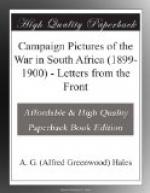Then he switches off from the artillery, and tells a blood-curdling tale of Boer treachery and cowardice. He tells how the enemy held out the white flag to coax our men to stop firing. Then, in awe-inspiring tones, he sobs forth a tale of dark and dismal war, how our soldiers respected the white flag and rested on their arms, only to be mowed down by a withering rifle fire from the canaille who represent the enemy in the field. Having got so far, he does not feel justified in stopping until he has thrown in some flowery language concerning a Boer cannonade upon British ambulance waggons, full of wounded; from that he drifts by easy and natural stages to Dum-Dum bullets, and the robbing of the wounded, and insults to the slain. And that is very often the person who is quoted in newspaper interviews—as a gentleman who was an eye-witness, and etc., etc., etc.
And yet, for some reason which I have been unable to gauge, the military authorities talk of sending all correspondents away from the front. It seems to me that it would be far better to give bona fide newspaper men every reasonable opportunity of discovering the truth instead of hampering them in any way. I fail to see why Great Britain and her Colonies should be kept in the dark concerning the progress of the war, for all the foreign Powers will be well supplied with information from the Boer lines; and, if we are blocked, some at least of the British newspapers will most assuredly go to foreign sources for news, if they are not allowed to obtain it for themselves. Others will content themselves with news gathered haphazard, and the last state of the Army, as far as the public mind is concerned, will be far worse than the first.
Colonel Hoad, who commands the Australians at Enslin, has offered the seven hundred and sixteen men, who up to date have acted as infantry, to the authorities as mounted infantry, and the offer has been accepted, much to the delight of the men, all of whom are very eager to get into the saddle, as they imagine that when their mounts arrive they will get a chance to go into action. They have been practising horsemanship during the day, and did fairly well, as many of them are expert riders, many more are fair; but a few of them are more at home on a sand-heap than in a saddle. There are not many of the latter kind, however. They will soon knock into shape, for Colonel Hoad hates the sight of a slovenly horseman as badly as a duck hates a dust storm. He is an untiring rider himself, and will work the beggars who cannot ride until they can.




